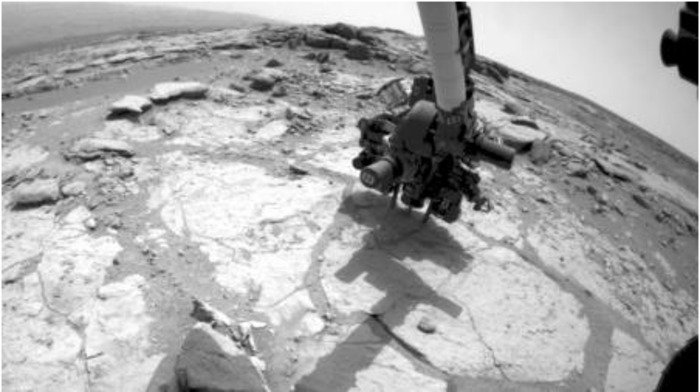An image from the Curiosity rover's Front Hazard-Avoidance Camera shows the rover drilling into its second rock target, Credit: NASA/JPL-Caltech
PASADENA, Calif., Dec. 13 (UPI) -- NASA scientists say the Curiosity rover on Mars has performed the first rock-dating experiment ever conducted off Earth.
While the ages of rocks from other planetary bodies like meteorites and moon rocks have been analyzed before, that analysis has always been done on samples here on Earth.
Now, for the first time, researchers have successfully determined the age of a martian rock with experiments performed on Mars, the California Institute of Technology in Pasadena, Calif., reported Thursday.
Findings from the first such experiment on the Red Planet, published in the journal Science Express, provide the first age determinations performed on another planet, the institute said.
A sample of martian rock taken from an outcrop in Gale Crater near the rover's landing site was heated to temperatures high enough that the gasses within the rock were released and could be analyzed by Curiosity's on-board mass spectrometer.
Caltech geochemist Ken Farley and his colleagues determined the age of the sample to be about 3.86 billion to 4.56 billion years old.
"In one sense, this is an utterly unsurprising result -- it's the number that everybody expected," Farley said.
However, the researchers acknowledged, there is some uncertainty in their measurement.
The sample analyzed was sedimentary rock -- formed in layers over a span of millions of years from material eroded from the crater walls -- and thus the age of the sample drilled by Curiosity really represents the combined age of those bits and pieces, they said.
Still, they said, the results were encouraging, especially since the experiment was suggested long after the final design parameters of Curiosity's instruments were finalized.
The rover's instruments "weren't designed for this purpose, and we weren't sure if the experiment was going to work, but the fact that our number is consistent with previous estimates suggests that the technique works, and it works quite well," Farley said.















